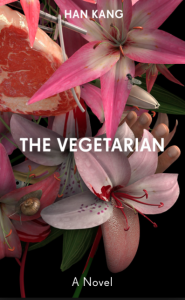
Ever since The Vegetarian (채식주의자 – Chaesikju-uija) won the Man Booker International Prize for Fiction last year, I wanted to read it. I’m so glad I did. It’s so different from most other novels I’ve read recently; it’s mysterious, fresh, and powerful. It made me think of Yoko Ogawa and Kafka.
Han Kang was born in Gwangju, South Korea. Her writing has won many prizes. She currently teaches creative writing in Seoul.
The Vegetarian is divided into three parts, each told by another narrator who is related to the main character Yeong-hye, the vegetarian of the title.
Part 1, The Vegetarian is told by Yeong-hye’s husband. He is an ordinary office worker, while she’s a housewife. Things are not great between them but the marriage seems to work anyway until the day Yeong-hye decides she wants to be a vegetarian. She’s had upsetting nightmares and feels the urge to become a plant. What follows is quite shocking. This seemingly simple decision has unbelievable repercussions. Her refusal to eat meat triggers a flood of violence, especially from the men in the family. Her husband treats her sadistically; her father beats her. The women are baffled as well but they do not react so violently. During a family reunion, things escalate and Yeong-hye almost dies. (Trigger Warning – there’s a graphic description of one of Yeong-hye’s dreams. It’s short, less than a page, but describes a horrible cruelty against a dog. If, like me, you’re sensitive, skip it. I wish, I had been warned).
Part two, Mongolian Mark, is told by Yeonh-hye’s brother-in-law, an artist. Her vegetarianism and the subsequent family drama, trigger a dark and surreal side in him. After he hears that his sister-in-law’s Mongolian Mark is still visible, he becomes more and more obsessed with her. He fantasizes about covering her body in flower paintings and film her while she makes love with a man whose body has been painted the same way. When he tries to live his fantasy, things get out of hand.
Part 3, Flaming Trees, is told by Yeong-hye’s sister. She’s divorced from her artist husband. At the beginning of this part she’s on her way to a psychiatric hospital. Yeong-hye has been there for months. She has stopped eating because she wants to be a tree. The doctors fear for her life. Her sister tries to feed her, but she also tries to understand her.
At the beginning of this post, I wrote that the book did remind me of Yoko Ogawa and Kafka. Like Ogawa, Han Kang explores the darker sides of passion, sexuality and lust, and like Kafka, she manages to make you feel what she wants to say. I often understood Kafka’s enigmatic stories on an emotional level. I tried to feel what he described, experience the mood, the atmosphere, and that’s how I understood him. Yeong-hye is an enigmatic person and her vegetarianism is about more than not eating meat. It’s a deeper form of vegetarianism. She wants to become a being that cannot harm anymore. The way Han Kang described it we can really feel how violent it is to eat meat. But not only that, the reactions also show us a patriarchal society in which violence is used to keep others in check. That someone wants to do something nobody else does – vegetarianism seems far less common in South Korea than in Western societies – threatens the status quo. Yeong-hye breaks free and this is seen as an act of rebellion that must be punished.
The three parts form a whole but they are very different. The first analyses the society and its patriarchal structure. Part two explores eroticism and sexuality and uses art as a means to symbolise certain aspects. Yeong-hye wants to be a tree but her brother-in-law, who wants to transform her and later himself into a flower, is interested in the erotic aspects of her desire. In part three, finally, psychological aspects are explored. Yeong-hye’s sister is the only person who tries to really understand her and her motivations.
Although Yeong-hye’s vegetarianism comes from other sources than most other people’s vegetarianism, the book is still very realistic at depicting the reactions of those who eat meat. I remember more than one family dispute, especially with my father, when I didn’t want to eat meat. He too, could react aggressively, as if my refusal threatened him. I remember one meal in particular and it still upsets me to think of it. He knew that I didn’t eat meat and when he invited me for dinner, I assumed I would just leave out the meat and eat everything else. But there was nothing else. Just meat in a sauce.
The Vegetarian is beautiful and mesmerising. Its message and images will stay with me for a long time. I loved it.
If you’d like to read another review – here’s Tony’s take on the novel. Those interested in South Korean literature will find many valuable resources on his blog.
